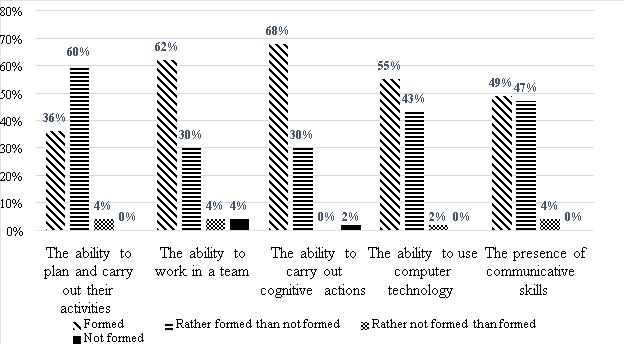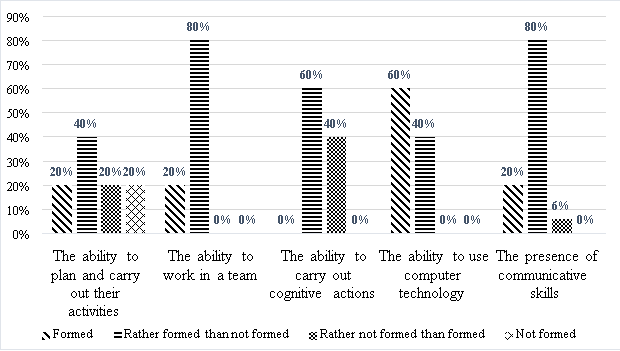The article is devoted to the problem of the formation and assessment of meta-subject competencies among students of secondary vocational education. The authors explain the importance of such competences in the modern world and highlight the main types of meta-subject competencies.
Keywords: meta-subject competencies,general competence, universal learning activities, Federal State Educational Standard of secondary vocational education.
Nowadays employers are interested in employees with not only highly specialized knowledge and skills, but able to think critically, be creative in solving problems, and have self-organization, cooperation and communication skills (“key skills”, “skills of the 21st century”) [1].
In addition, the introduction of new educational standards indicates the need for modernization of vocational education in the direction of expanding the knowledge and skills necessary for productive work both in production and in the sphere of life in general. Thus, today “the task is to update vocational education on a competency basis by strengthening the practical orientation of vocational education while maintaining its fundamental nature” [2].
Therefore, it is obvious that the society, the state and a person are interested in the formation and development of these skills.
As practice shows, for the formation of young, competitive specialists who can act in situations with a fuzzy task setting, it is necessary to focus on the development of mobility and critical thinking among students. It is also important to develop such skills as positive interaction and cooperation with colleagues, the ability to navigate in the ever-increasing flow of scientific and specialized information, the ability to individual creative approach to self-solving professional tasks of the future profession.
We can also conclude that it is extremely important for continuing education to continue to form and develop metasubject competencies in students of secondary vocational education. This is evidenced by the comparison of requirements for a future specialist and the educational results laid down in the Federal State Educational Standard.
In the installation documents, meta-subject activity is correlated with such a concept as universal educational actions, which in turn are divided into regulatory, communicative and cognitive actions. In accordance with the theory of A. V. Khutorskogo [3] “Meta-subjectivity characterizes going beyond objects, but not avoiding them. «A meta-subject is that which is behind the subject or behind several subjects, is at their base and at the same time in the root connection with them». N. Gromyko notes that “The meta-subject approach in education and, accordingly, meta-subject educational technologies were developed in order to solve the problem of disunity, fragmentation, separation of different scientific disciplines from each other and, as a result, educational subjects.” [4]. According to R. D. Dylgyrova [5] defines as a general point “the orientation of the meta-subject approach to the formation of a holistic picture of the world on the basis of a single connecting element (which in this case can be certain semantic concepts, different types of activity (universal, mental, heuristic; basic abilities), overcoming the costs of subject education, leading to a narrow monodisciplinary vision. «The following types of competencies are distinguished in the Federal State Educational Standard for Secondary Professional Education: general and professional. Eleven competencies that a graduate must possess, regardless of the profession, are included in the General category. In our opinion, they can be correlated with meta- subject learning outcomes. Moreover, some competencies can be combined into groups:
- The ability to plan and carry out their activities;
- The ability to work in a team;
- The ability to carry out cognitive actions;
- The ability to use computer technology;
- The presence of communicative skills.
At the beginning of training, an important component of any educational process is the assessment and diagnosis of the formation of all types of competencies, i.e. It is important to answer the question: “How to get information about a student at the beginning of his professional training?”
The results of state final exams and grades in the certificate provide information on intellectual development and the availability of skills necessary for the development of a specific educational program. But we should not forget that for successful professional development we need to give a special place to meta-subject competencies that are not subject to any assessment [6].
First-year students were asked to undergo a survey in which they had to use the Likert scale to assess the level of formation of such competencies as
− the ability to plan and carry out their activities;
− the ability to work in a team;
− the ability to carry out cognitive actions;
− the ability to use computer technology;
− communication skills.
In addition, the experts were asked to go through the same questionnaire in order to evaluate these competencies for the same students.
According to the results of the survey, the following data were obtained Fig.1 and Fig.2.

Figure 1. Personal data of first-year students

Figure 2. Expert profiles
According to Figure 1, more than 60 % of students believe that they have formed such competencies as the ability to work in a team and the ability to perform cognitive actions. About half of the students are developed communication skills and the ability to use computer technologies. And only 36 % have the ability to plan and carry out their activities. Note the fact that the largest gap in the level of formation occurs between the ability to carry out cognitive activities and the ability to plan and carry out their activities. Experts believe that this group of students is more likely to have formed than not formed skills in working in a team and communication skills. Regarding the ability to plan and carry out their activities, the experts did not agree, but a little less than half believe that this competency is more formed than not formed among students.
Analysis fig. 2 shows that, according to experts, students are more likely to have formed than not formed teamwork skills and communication skills. Regarding the ability to plan and carry out their activities, the experts did not agree, but anyway only a few believe that this competency is more formed than not formed among students.
The results of the survey allow concluding that the assessments of this type of competence do not coincide between students and specialists. Therefore, this type of assessment and diagnosis of meta-subject competencies must be objectified. In addition, quite a lot of interest are shown in this kind of competencies; therefore, the diagnosis of meta-subject results is an urgent problem now.
References:
- Dudyrev F. F., Romanova O. A., Shabalin A. I., etc. Young professionals for the new economy: secondary vocational education in Russia: monograph / Moscow: HSE Publishing house, 2019.
- Nekrasova S. V. Formation of professional competence of students / / Young scientist. No 17. Russia: Young scientist, 2016, P. 140–142.
- Khutorskoy A. V. The meta-subject content of general education and its reflection in the new educational standards [Electronic resource] // A. V. Khutorskoy. Personal site — Chronicle of being; 11/27/2012 — http://khutorskoy.ru/be/2012/1127/index.htm
- Gromyko N. Metasubject approach in education in the implementation of educational standards [Electronic resource] / Gromyko N. — Electron. journal. Moscow: ZAO «publishing house " Uchitelskaya Gazeta», 2010. — http://www.ug.ru/archive/36681
- Dylgyrova R. D. The ideas of meta-subjects in pedagogy // Uchenye zapiski Zabaykalsky State University. Series: pedagogical sciences. No. 5. Vol. 58. Russia: Federal State Budgetary Educational Institution of Higher Education «Transbaikal State University», 2017, P. 6–13.
- Zotova S. A. Diagnostics of meta-subject learning outcomes: approaches, problems, prospects [Electronic resource] // Science in a megalopolis. — 2017. — No. 4. URL: https://mgpu-media.ru/issues/issue-4/system-education-quality-assessment/the-diagnostiks-of-metadisciplinary-results-approaches-problems-perspectives.html







